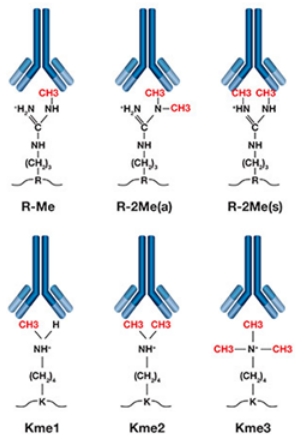Methylation-modified peptides, also known as methylation-recognized peptides, are protein post-translational decorations (PTMs) and play a key regulatory role in almost all life activities in cells. Proteins are catalyzed by methyltransferase to transfer hydroxyl groups to specific amino acid residues for covalent binding. Methylation is a reversible modification process catalyzed by demethylases.
Studies have shown that the common methylated/demethylated amino acids are usually lysine (Lys) and arginine (Arg). Studies have found that histone lysine methylation has a variety of biological functions such as stem cell maintenance and division, X chromosome inactivation, transcription regulation and DNA damage response. “, usually affects chromatin condensation and represses gene expression.” Histone arginine methylation plays an important role in the regulation of gene transcription and can affect various physiological processes in cells, including DNA repair, signal transduction, cell development, and carcinogenesis. Therefore, Guopeptide Biology has specially developed the technology of methyl decorative peptides, which are modified by scientists after protein translation (PTMS) to help in the research.
Methylation modification (Me1, Me2, Me3)
High quality Fmoc-Lys(Me,Boc)-OH, Fmoc-Lys(Me2)-OH, Fmoc-Lys(Me3)-OH.HCL, Fmoc-Arg(Me,Pbf)-OH, Fmoc-Arg(Me)2-OH.HCl(asymmetrical), F were used moc-Arg(me)2-OH.HCl(symmetrical) and other raw materials were generated by FMOC solid-phase synthesis process to obtain Lys and Arg methylated peptides, and the products were purified by HPLC. Relevant mass spectra, HPLC chromatograms and COA are provided for the finished product.
Post time: Nov-24-2023

